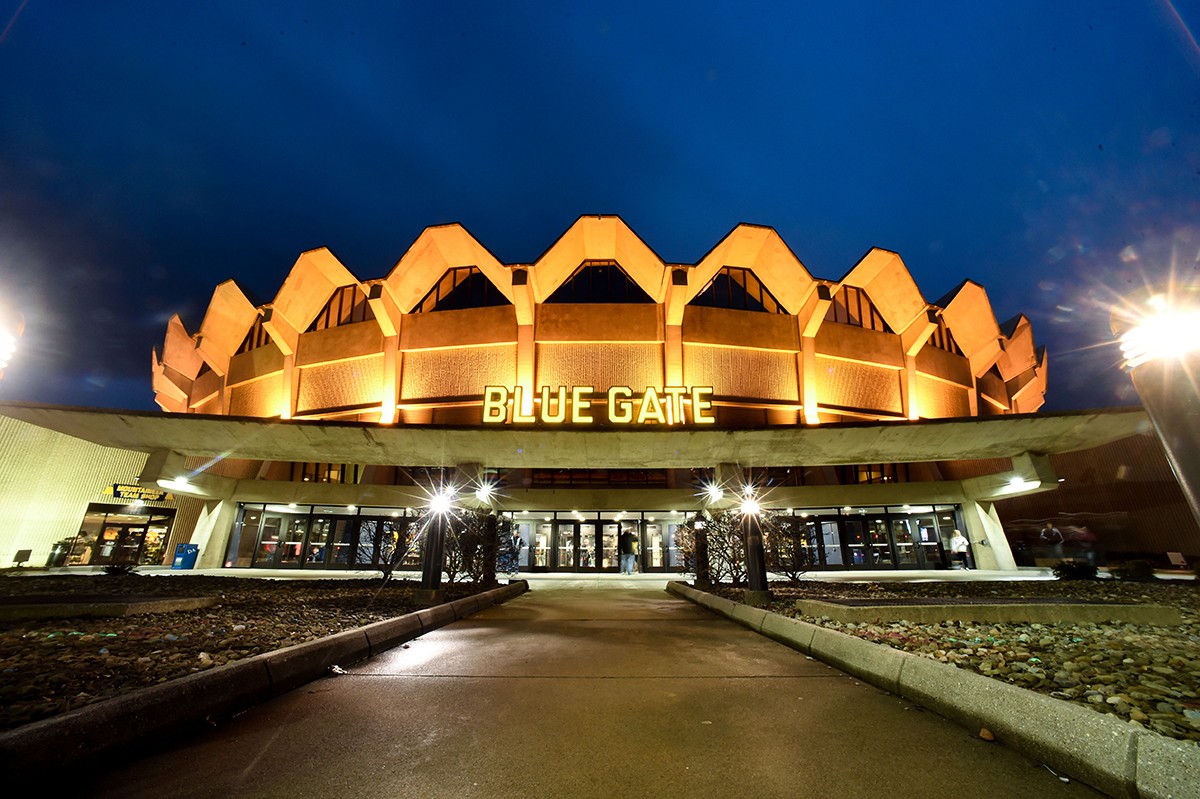MORGANTOWN — The WVU Board of Governors gave its stamp of approval to a variety of renovation projects at athletic facilities during its Friday meeting.
Athletic Director Shane Lyons brief the Finance Committee on the projects prior to the BOG meeting, and the committee passed along its recommendation to approve the authorizing resolution. The total cost is estimated at $26 million, but counting funds on hand, WVU needs to finance $21 million.
All 14,000 seats at the Coliseum will be replaced. “We have close to a 50-year-old building that the seats have never been replaced,” he said. “We were getting to a point where a lot of those seats were broken and parts for the seats couldn’t be located.”
The estimated cost is $4 million. However, President Gordon Gee pointed out that the new seats were donated.
Work will begin after graduation and should be completed by fall, Lyons said.
The Coliseum and Milan Puskar stadium will get new video boards. The project total is $11.8 million.
The Coliseum will get a new center video board to replace an outdated one for which parts are scarce and the video quality is below par, he said. The new one will be almost twice as large: 1,796 square feet compared to 896 square feet for the old one. As part of this project, the Coliseum will also get new LED lighting and sound.
Puskar will get a new south end zone video board. It will be about 40% larger than the 2-year-old north end zone board, Lyons said: 5,896 square feet compared to 3,589 square feet. Mountaineer Field will also get a new sound system this summer.
In a separate project, the West Side Suites at Puskar, in the first level of the press box, will be renovated. They were previously renovated in the early 2000s and have reached the end of their life, according to background notes. The cost will be $1.1 million.
Athletics is also looking at renovating and repurposing the decommissioned Natatorium now that the pool has moved to Mylan Park, Lyons said. It will be converted to a Performance Center for strength training and conditioning, nutrition, hydrotherapy and other services to support Olympic sports. The $10 million project is funded by a private donation from the Hazel Ruby McQuain Trust and should be competed in fall 2021.
The pool will be filled in and the deck will be converted into a large open space. The solid wall facing the Coliseum will be replaced with a glass curtain wall to let in natural light.
Other business
The BOG OK’d the transfer of buildings and property at the Montgomery campus to the state Armory Board to house the second Mountaineer ChalleNGe Academy. The immediate transfer involves Conley and Maclin Halls and Tech Center, but the BOG approved standing authority to make additional transfers for the calendar year as the National Guard moves forward with the project.
With two buildings already transferred to BridgeValley Community and Technical College, staff said, four buildings remain available at Montgomery.
The BOG approved an amendment to its sublease regarding the Evansdale Crossing building on the Evansdale Campus. WVU had leased most of the building, except for the restaurant space, which was leased to Fresh Capital, a hospitality service that ran the restaurants.
Sodexo, which operates the rest of WVU’s food services. Sodexo bought out Fresh Capital’s lease. So WVU will sublease that portion of the building from its partner, WVU Connector, and Sodexo will pay rent for the use of the space.
Sodexo will pay a starting annual rate of $370,000, increasing 2% per year. Starting in 2023, WVU will also start collecting a commission on food sales.
Starting this spring, Provost Maryanne Reed said, WVU plans to offer, pending BOG approval, a “Maymester.” This retention effort would run May 11-29 and allow students who were unsuccessful in courses to re-take them in a condensed form. For this spring, they look to do a pilot offering of 15 courses at the flat in-state tuition rate.
Gee updated the BOG on the fatal shooting at the College Park residence hall. “We do not know the exact reason but it was obviously a targeted effort,” he said. From there he talked more broadly about student mental health and the mental health offerings on campus.
He referred to a report that shows higher education institutions are treating more students than ever before mental health challenges, primarily anxiety, stress and depression. A Cigna report says Gen Z students – the current college population – reports the highest level of loneliness ever reported. And the suicide rate for young adults has risen by 51% over the last decade.
“Showing students that we care about them and giving them the tools to thrive has never been more important,” he said. He mentioned the Crisis Text Line and the Carruth Center for Psychological and Psychiatric Services, which is the hub for WVU’s mental health initiative.
Tweet David Beard @dbeardtdp Email dbeard@dominionpost.com




